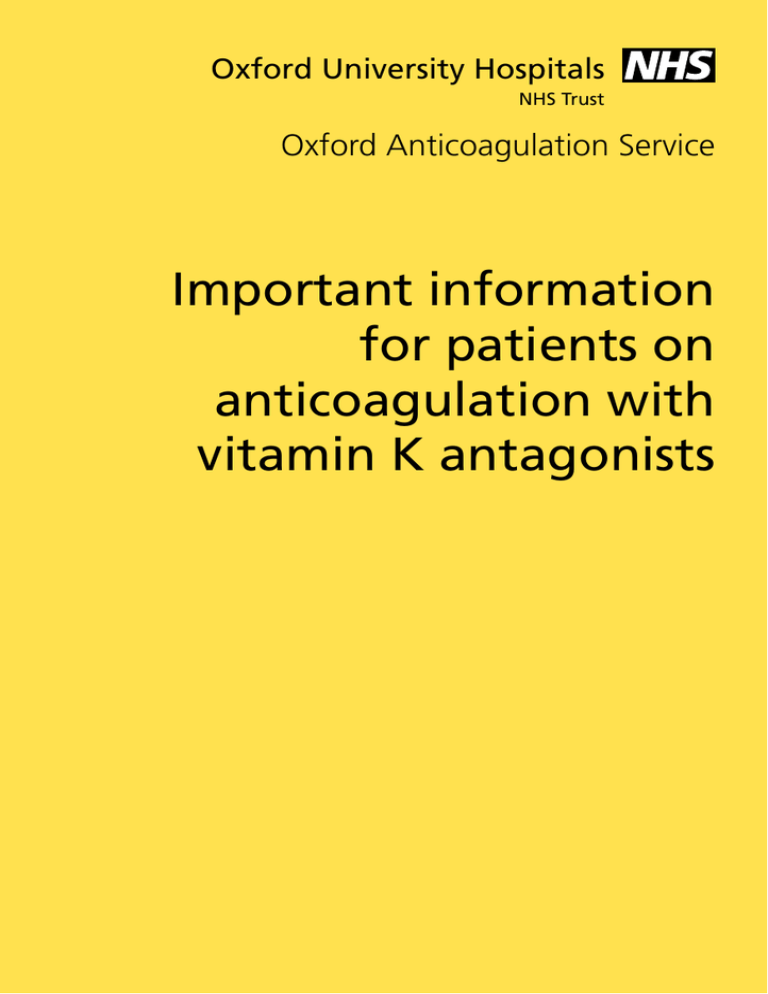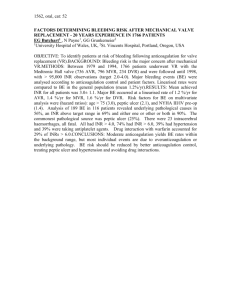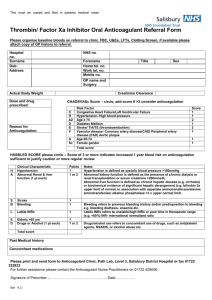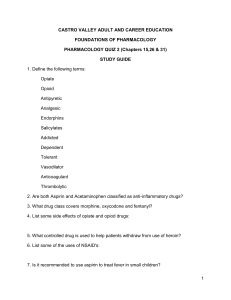Important information for patients on anticoagulation with vitamin K antagonists
advertisement

Oxford University Hospitals NHS Trust Oxford Anticoagulation Service Important information for patients on anticoagulation with vitamin K antagonists Page 2 Your information Name: ............................................................................................................................................ Address: ............................................................................................................................................ ............................................................................................................................................ ............................................................................................................................................ e i k c t sti n e i t r pa o NHS number:................................................................................................................................... Hospital number:.......................................................................................................................... Home telephone number: ...................................................................................................... Mobile telephone number: .................................................................................................... GP name:............................................................................................................................................ e i k c i P st GP address:....................................................................................................................................... or G ............................................................................................................................................ ............................................................................................................................................ GP telephone number:.............................................................................................................. GP fax number: ............................................................................................................................. Next of kin name:......................................................................................................................... Next of kin telephone number:........................................................................................... Condition requiring treatment Name of anticoagulant Target INR Desired therapeutic range Date treatment started Duration of therapy Referring clinician Additional information: Page 3 What is this booklet for? This booklet has been given to you because you have started to take a medicine known as a vitamin K antagonist (VKA) which acts as an anticoagulant. This will usually be a tablet called warfarin, but may be another type of VKA. A nurse, pharmacist, or doctor will go through this booklet with you. They will explain what it all means and answer any questions you may have. This may be while you are in hospital, when you go to the Anticoagulation Service clinic, or at your GP surgery. What information does this booklet contain? This booklet gives you important information about your treatment. It also tells you who to talk to if you need more information or advice. Please keep this booklet at home so you can look at it when you need to. What other information will I be given? You will be given: •an Anticoagulant Alert Card. You should carry this with you at all times. This card tells people that you are taking an anticoagulant medicine. This information may be important in an emergency. •an Anticoagulant Therapy Record. This will be sent to you every time you have an INR blood test. It will show: – your latest INR blood test result – the dose of anticoagulant you should take – the date you should have your next blood test. •a folder in which you can keep your Therapy Records. Always have your latest Therapy Record with you when you are collecting a repeat prescription for your anticoagulant medicine. Page 4 Contents of this booklet 1. What are anticoagulant medicines for and how do they work? 2. Your anticoagulant medicine 3. Checking and monitoring your anticoagulant medicine and knowing what dose to take 4. Are there any serious side effects of taking anticoagulants? 5. What other things can affect anticoagulant medicines? 6. Going to the dentist or having an operation 7. Additional information for women taking anticoagulants 8. Other information 9. About The Oxford Anticoagulation Service Page 5 1. What are anticoagulant medicines for and how do they work? Anticoagulants work by making your blood take longer to clot than it normally does. This reduces the risk of harmful blood clots forming in your blood vessels. 2. Your anticoagulant medicine How do I take my anticoagulant? • Take your anticoagulant once a day. • Take it at about the same time each day. What should I do if I miss a dose or take the wrong dose? • If you miss a dose, make a note on your next blood test form and continue the next day with your normal dose. Do not take an extra dose to “catch up”. • If you took the wrong dose and this was much more than your normal dose, contact your anticoagulation service or GP straight away. What do warfarin tablets look like? Different brands of warfarin may have different markings to those shown below, but each strength will always be the same colour. 0.5 mg (500 micrograms or half a milligram) White 1 mg (one milligram) Brown 3 mg (three milligrams) Blue 5 mgPink (five milligrams) Page 6 You may need a mixture of different strength tablets to make up your correct dose. The nurse, pharmacist or doctor will explain this to you. You will be given your dose in the number of milligrams and not the number of tablets. Other VKA anticoagulant medicines Most people on a VKA take warfarin, but there are two other VKAs called: • phenindione (Dindevan®) • acenocoumarol (for example Sinthrome®) These come in different strengths and colours. If you need to take one of these medicines your nurse, doctor or pharmacist will explain them to you. 3. Checking and monitoring your anticoagulant medicine and knowing what dose to take You must have a regular blood test to check that the dose of anticoagulant you are taking is correct. This blood test is called an INR test. What is the ‘INR’ • INR stands for ‘International Normalised Ratio’. It measures how long your blood takes to clot. • If you were not taking warfarin or another anticoagulant, your INR would be around 1.0. • The longer the blood takes to clot, the higher the INR level. For example an INR of 2.0 means that the blood is taking about twice as long as normal to clot. Working out the dose to take • The therapeutic INR range required for your condition is written in the front of this booklet. The aim is to keep your INR within, or very close to your therapeutic range, as this is when your anticoagulant is safest and most effective. • Ask the nurse, pharmacist or doctor if you are not sure of what your INR should be. • If your INR result is too low your anticoagulant dose will be increased. • If your INR result is too high your anticoagulant dose will be reduced. Page 7 Ordering repeat prescriptions When you request a repeat prescription you may be asked to provide information about your INR test results and current dose of oral anticoagulant. Please take your latest Therapy Record with you if you see your GP. Your local pharmacist may also ask to see this information when they dispense your prescription. Make sure that you do not run out of tablets and always have at least a week’s supply in hand. 4. Are there any serious side effects of taking anticoagulants? Like all medicines, anticoagulants have side effects. The most serious side effect of anticoagulants is bleeding. You should contact your GP urgently or go to the nearest Emergency Department if you experience any of the following: • nosebleeds that last more than 10 minutes • blood in your vomit or sputum • passing blood when you go to the toilet – either in your urine or faeces • passing black coloured faeces • severe or spontaneous bruising (bruising that appears for no reason) • unusual headaches. If you are experiencing less severe nosebleeds (that stop easily after one or two minutes) please discuss this with your GP or the nurse at the anticoagulation service. If you cut yourself, apply firm pressure to the area for at least five minutes, using a clean, dry dressing. There is more information about side effects on the leaflet provided in the packet with your medicines. Page 8 5. What other things can affect anticoagulant medicines? Other medicines Many medicines can affect anticoagulants. You should always mention that you are on anticoagulants when talking to a doctor, nurse or pharmacist about other medication. Prescribed medicines: • If you stop or start another medicine while taking an anticoagulant the person prescribing the medicine may tell you to have a blood test within 5 to 7 days of starting or stopping the new medicine. This is to make sure that your INR level has not changed. • Please talk to your anticoagulation service for further advice. Over the counter medicines including alternative remedies (like herbal or homeopathic remedies): • Always tell the pharmacist that you are taking an oral anticoagulant and show them your anticoagulant alert card. • Talk to your GP or anticoagulation service before starting any herbal remedies, vitamins or supplements. This is because these can affect your INR and the amount of anticoagulant you need. • Your pharmacist can advise you on medicines that are safe for you to take. • Please talk to your anticoagulation service if you are unsure or would like further advice. Aspirin and medicines called ‘non-steroidal anti-inflammatories’ (or NSAIDs): • Do not take aspirin or medicines like aspirin (such as diclofenac, ibuprofen or naproxen) unless your GP or another doctor has prescribed it, knowing that you are taking anticoagulants. Taking painkillers • Paracetamol and codeine-based painkillers are fine to take, but contact your anticoagulation service if you start taking the maximum Page 9 daily dose on a regular basis. The maximum daily dose should be written on the packet or pharmacy label. If it is not then check with your pharmacist. • Be aware that some paracetamol ‘plus’ medicines contain aspirin. This should be clearly written on the label but ask the pharmacist if you are not sure. Diet It is important to eat a well-balanced diet. If you have major changes in your diet this may affect how your body responds to your anticoagulant medicine. If you would like more information about your diet speak to the anticoagulation clinic. Alcohol A moderate intake of alcohol will not affect your anticoagulation but ‘binge drinking’ is dangerous while taking anticoagulants. Sickness & diarrhoea If you have sickness and diarrhoea that lasts more than one or two days, this may affect your INR result. You should have an INR test even if you are not due for one. 6. Going to the dentist or having an operation Going to the dentist Most dental treatment can go ahead as normal without your anticoagulant being stopped. Make sure your dentist knows that you are taking an anticoagulant before your appointment date. You will need to have an INR test within the three days before your procedure. Having an operation If you are having planned surgery, make sure you tell the doctor or pre-assessment clinic nurse that you are taking an anticoagulant. You may need to stop your anticoagulant for a few days before your operation, but the doctor will discuss this with you. Page 10 7. Additional information for women taking anticoagulants Pregnancy and breast feeding Oral anticoagulants can affect the development of a baby in early pregnancy. It is important to make sure you are using reliable contraception to avoid becoming pregnant. If you are a woman taking anticoagulants you should talk to your doctor about plans for pregnancy, before trying for a baby. If you think you are pregnant while taking anticoagulants you should have a pregnancy test as soon as possible. If this is positive make an urgent appointment to see your doctor. It is safe to breastfeed while taking anticoagulants. Periods You may have heavier periods while taking anticoagulants. If this happens you should talk to your GP or the anticoagulation service. 8. Other information Wearing an alert bracelet As well as carrying your Anticoagulant Alert Card, you may wish to wear an alert bracelet if you are on long term anticoagulation. Playing sport It is best to avoid contact sports while you are on anticoagulants. This is because you may bleed a lot more if you are injured. You can discuss this further with the nurse at the anticoagulation service, if required. Page 11 9. Information about the Oxford Anticoagulation Service This section of the booklet is about the Anticoagulation Service in Oxford. If your GP surgery does not use the Anticoagulation Service, or you live outside the Oxfordshire area, then this section will not be relevant to you. Your own GP will tell you about your local arrangements for blood tests and monitoring. In this section: a.The Anticoagulation Service opening hours b.Where to have your INR blood test c.Finding out your blood test results d.Your Therapy Record e.How to contact the Anticoagulation Service f.What to do if you need an INR blood test when you are away from the Oxford area a. The Anticoagulation Service opening hours The Anticoagulation Service is based at the Churchill Hospital in Oxford and the Horton General Hospital in Banbury. It is run by specialist nurses (called Thrombosis nurses) and the haematology consultants. •The service operates Monday to Friday (excluding bank holidays) between 9am and 5pm. •Routine testing is Monday to Thursday only. Please avoid having a blood test on a Friday unless the Anticoagulation Service or your doctor asks you to. b. Where to have your INR blood test You will have your blood tests at your GP surgery. Your surgery will tell you how to arrange this. Page 12 c. Finding out your blood test results By post You will be sent an ‘Anticoagulant Therapy Record’ form every time you have an INR blood test. This will include • your INR result • the dose instructions of the anticoagulant you should take • the date of your next INR blood test. By telephone You will receive a telephone call, the day after your test, only if: • we make a major change to your anticoagulant dose, or • we want you to have your next INR test within a week If you do not receive a phone call please continue to take the dose of anticoagulant you are currently taking until you receive your Anticoagulant Therapy Record in the post. If you are particularly concerned or have not received your record in the post within three days of having your test, you can telephone the Anticoagulation Service. d. Your Therapy Record You should take the lower part of the form to your GP when you have your blood test. If you are having your blood test at an outpatient appointment please ask the person taking your blood to use this form. You should complete the questionnaire on the form before each blood test. If you do not have your form with you please ask the person taking your blood to write the word ‘RAID’ on the request form they use. This will mean that the result will be seen by the Thrombosis Nurses. ‘RAID’ stands for ‘Rapid Anticoagulant Interpretation & Dosing’ and is the name of the computer program the nurses use to help work out your correct dose. Page 13 e. How to contact the Anticoagulation Service The telephone lines are open from 9am to 5pm. (Monday to Friday, excluding Bank holidays.) Churchill Hospital Telephone 01865 857 555 Fax 01865 225 296 Email: ac.service@nhs.net Horton General Hospital Telephone 01295 229 224 Fax 01295 229 225 f.What to do if you need an INR blood test when you are away from the Oxford area If you know you will need a test when you are away please talk to the Anticoagulation Service about this. Take your Anticoagulant Therapy Record to a local hospital or GP surgery and ask for an INR blood test. You should telephone the hospital or GP first to arrange this. Find out if you can wait for the result or give a contact number where you can be contacted locally. Once you have the INR result, telephone or email the Oxford Anticoagulation Service on the same or next day. The nurse at the Anticoagulation Service will tell you your anticoagulant dose and next test date by phone. Travelling in the UK If you are staying with family or friends, or if you will be away but still in the UK for more than a few weeks, you should register with a local GP as a temporary patient. Travelling abroad •Where possible you should contact your Anticoagulation Service for advice before you travel. • Be sure to take enough tablets with you for the whole trip. • You should keep a copy of your prescription with you. •You should take your Anticoagulant Alert Card with you in case of emergencies. In an emergency you should see a doctor where you are staying. Page 14 Page 15 If you have a specific requirement, need an interpreter, a document in Easy Read, another language, large print, Braille or audio version, please call 01865 221 473 or email PALSJR@ouh.nhs.uk Authors: Thrombosis Team August 2014 Review: August 2017 Oxford University Hospitals NHS Trust Oxford OX3 9DU www.ouh.nhs.uk/patient-guide/leaflets/library.aspx OMI 10708P



